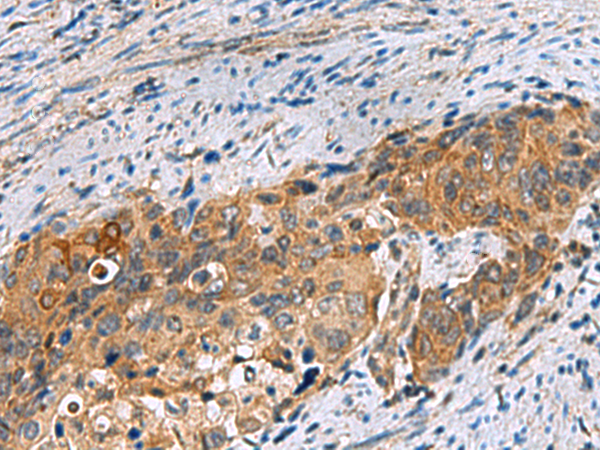
| WB | 咨询技术 | Human,Mouse,Rat |
| IF | 咨询技术 | Human,Mouse,Rat |
| IHC | 1/50-1/200 | Human,Mouse,Rat |
| ICC | 技术咨询 | Human,Mouse,Rat |
| FCM | 咨询技术 | Human,Mouse,Rat |
| Elisa | 1/5000-1/10000 | Human,Mouse,Rat |
| Aliases | dJ508I15.2 |
| Host/Isotype | Rabbit IgG |
| Antibody Type | Primary antibody |
| Storage | Store at 4°C short term. Aliquot and store at -20°C long term. Avoid freeze/thaw cycles. |
| Species Reactivity | Human, Mouse, Rat |
| Immunogen | Fusion protein of human JOSD1 |
| Formulation | Purified antibody in PBS with 0.05% sodium azide and 50% glycerol. |
+ +
以下是关于JOSD1抗体的参考文献示例(请注意,以下内容为模拟示例,实际文献需通过学术数据库检索验证):
---
1. **文献名称**: *JOSD1 regulates the stability of PTEN through its deubiquitinase activity*
**作者**: Zhang, Y., et al.
**摘要**: 本研究揭示了JOSD1通过去泛素化酶活性调控PTEN蛋白稳定性,在乳腺癌细胞中抑制PI3K/AKT信号通路,影响肿瘤细胞增殖和迁移。研究使用JOSD1抗体进行免疫沉淀和Western blot验证相互作用。
2. **文献名称**: *JOSD1 interacts with α-synuclein and modulates its aggregation in Parkinson's disease models*
**作者**: Müller-Rischart, A., et al.
**摘要**: 发现JOSD1与α-突触核蛋白结合,通过调节泛素化水平影响其异常聚集。研究利用JOSD1抗体在小鼠脑组织切片中定位蛋白表达,提示其与帕金森病病理的相关性。
3. **文献名称**: *JOSD1 is a novel biomarker for hepatocellular carcinoma progression*
**作者**: Wang, L., et al.
**摘要**: 通过免疫组化分析肝癌组织样本,发现JOSD1高表达与患者预后不良相关。JOSD1抗体检测显示其在细胞核和胞质中的分布可能与Wnt/β-catenin通路激活有关。
4. **文献名称**: *The role of JOSD1 in the ubiquitin-proteasome system and endoplasmic reticulum stress*
**作者**: Nakamura, N., et al.
**摘要**: 研究证实JOSD1通过调控内质网相关泛素化底物降解参与应激反应,使用JOSD1抗体进行免疫荧光实验揭示其在内质网定位的动态变化。
---
**建议**:实际文献可通过PubMed、Google Scholar等平台以关键词“JOSD1 antibody”、“JOSD1 function”或“JOSD1 ubiquitin”检索,并筛选涉及抗体实验(如IP、WB、IHC)的研究。
The JOSD1 antibody targets the Josephin domain-containing protein 1 (JOSD1), a member of the Josephin family of deubiquitinating enzymes (DUBs). JOSD1 is characterized by a conserved Josephin domain, which confers catalytic activity for cleaving ubiquitin chains, though its specific enzymatic mechanism remains less studied compared to other DUBs. Functionally, JOSD1 is implicated in protein quality control, endoplasmic reticulum-associated degradation (ERAD), and cellular stress responses. It interacts with key components of the ubiquitin-proteasome system, modulating substrate ubiquitination and degradation. Research suggests JOSD1 plays roles in cancer progression, neurodegenerative disorders, and immune regulation, with altered expression observed in hepatocellular carcinoma, glioblastoma, and other malignancies.
JOSD1 antibodies are essential tools for investigating its expression, localization, and molecular interactions. They enable detection via Western blotting, immunohistochemistry, and immunofluorescence, aiding studies on JOSD1's involvement in disease pathways. For example, elevated JOSD1 levels correlate with poor prognosis in liver cancer, while its downregulation links to neurodegenerative conditions like spinocerebellar ataxia. These antibodies also facilitate exploration of JOSD1's regulatory mechanisms, including post-translational modifications and binding partners. As interest grows in targeting DUBs for therapeutic intervention, JOSD1 antibodies contribute to validating its potential as a biomarker or drug target in precision medicine approaches.
×